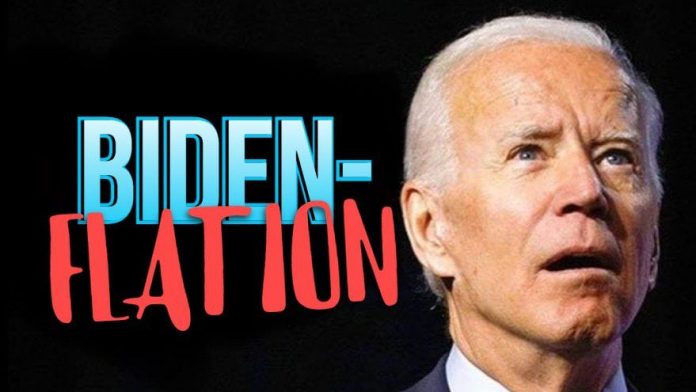The Washington Post recently published an article titled, “The economy is improving under Biden. But many voters aren’t giving him credit.” The Post credited six writers on the story’s byline. Six writers to compose an article that hypothesizes the economy is doing great, but voters are too stupid to realize how well things are?
This is what happens when people whose entire world revolves around the dinner parties of the Washington elite try to understand working-class Americans.
An examination of the data below the headlines shows that Americans continue to struggle under America’s economy and Biden’s self-named Bidenomics.
In December 2023, the inflation rate was 3.4%, as measured by the consumer price index. Television pundits and government spokespeople celebrated, pointing out that in December 2022, the inflation rate was at 6.4%, and thus inflation is under control.
This is a flawed argument that only holds water in the Washington, D.C. bubble. Inflation is not decreasing; the rate of increase is slowing.
Washington bureaucrats make the same false argument when discussing budget cuts, citing the reduction in the growth of spending as cost reductions, which they are not.
The fact is that compared to December 2021, inflation is up nearly 10%. And, while the rate of inflation growth has fallen significantly since its high of 9.1% in June 2022, compared to January 2021, prices are up more than 17.5%.
When one examines the “basket of needs,” those household expenses that must be incurred in order to live: food, shelter, and energy, inflation is not just bad, it is devastating.
This is especially true for low-income Americans for whom these expenses represent a greater percentage of income than for those who are more financially secure.
Per Fox Business, since the start of 2021, food prices are up 33.7%, shelter costs are up 18.7%, and energy prices are up a staggering 32.8%.
To put this into perspective, the typical American household must spend “an additional $11,434” annually just to maintain the same standard of living they enjoyed in January 2021.”
These inflation numbers are more than just statistics. The impact on working Americans is catastrophic.
The Federal Reserve Bank of New York reports that total household debt is at a record $17.29 trillion, while credit card debt is also at record highs, topping $1.2 trillion.
Sadly, working Americans are not incurring debt to buy new televisions and vacations, they are incurring debt to purchase food and to pay their utility bills, incurring 25% interest at the same time.
As their debt levels increase, working Americans are struggling to stay current on their bills.
Per the Philadelphia Federal Reserve, roughly 10% of credit-card borrowers owe more than $5,000. Between July 1 and September 30, 2023, nearly 30% of Americans in the one hundred largest metro areas were “at least 30 days behind on at least one debt payment,” which includes credit cards, auto loans, personal loans, mortgages, and student loans.
Forty percent of the 22 million Americans who had to begin repaying student loans in October of 2023 have yet to make their first payment.
Other microeconomic factors are also signaling trouble for the U.S. economy.
Approximately 45,000 home purchase agreements fell through in November 2023, nearly 17% of homes that had gone under contract that month, the highest percentage in the history of Redfin’s survey of home sales.
Even economic data that appears to be good news at the macro level signal trouble at the micro level.
The December jobs report showed that employers added 216,000, beating expectations, and the unemployment rate held at 3.7%. But the lion’s share of the growth came from a growing federal government, which added 52,000 jobs (don’t we want the government to shrink, not grow), and from low-paying jobs in the health care industry.
The workforce participation rate fell to 62.5% as more than 680,000 people left the workforce.
So while people insulated by the Washington, D.C. bubble feel no pain, working Americans are struggling, and they are blaming the president.
Per an ABC/Ipsos poll, only 33 percent of Americans approved of the job President Biden is doing, a decrease from his previous low of 37%. The president’s disapproval rating is at 58%.
He does worse on the economy, with 43 percent of Americans saying they are not as well off since Biden took office.
The president will have to pivot away from Bidenomics if he hopes to reinvigorate his reelection hopes.
Unfortunately for him, there is little he can point to that will excite the electorate. He polls worse on the border than he does on the economy. The world is experiencing two major wars, and American shipping is now under attack in the Red Sea.
Perhaps this explains why Biden recently gave a speech at Valley Forge, where he focused not on the economy and Bidenomics, but on former President Trump and Biden’s belief that Trump poses a threat to democracy.
Unfortunately for the President, the infamous words of Clinton advisor, James Carville, still ring true, “it’s the economy, stupid.”
Jim Nelles is a supply chain consultant based in Chicago, IL. He has served as a Chief Procurement Officer, Chief Supply Chain Officer, and a Chief Operations Officer for multiple companies. Jim served his country as a Naval Officer after attending college on an NROTC scholarship. He has a BA from Northwestern University in Economics and French as well as a Masters in Management from the JL Kellogg Graduate School of Business.
The post OP-ED: The Struggling US Economy appeared first on The Gateway Pundit.
This article may have been paraphrased or summarized for brevity. The original article may be accessed here: Read Source Article.





![President Trump Gives Barron A Shout Out At Inaugural Parade: His Unexpected Response is Pure Gold! [VIDEO] president-trump-gives-barron-a-shout-out-at-inaugural-parade:-his-unexpected-response-is-pure-gold!-[video]](https://news.lateawakening.com/wp-content/uploads/2025/01/35545-president-trump-gives-barron-a-shout-out-at-inaugural-parade-his-unexpected-response-is-pure-gold-video-100x70.jpg)



